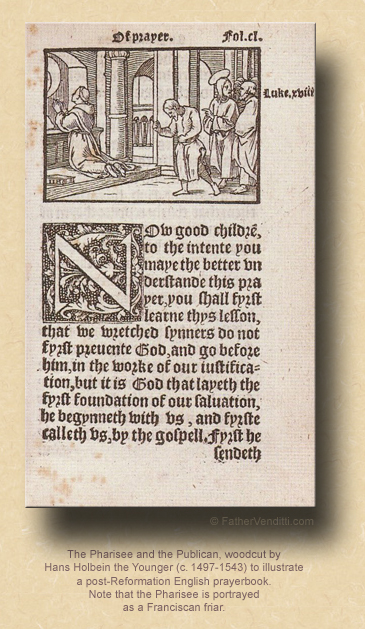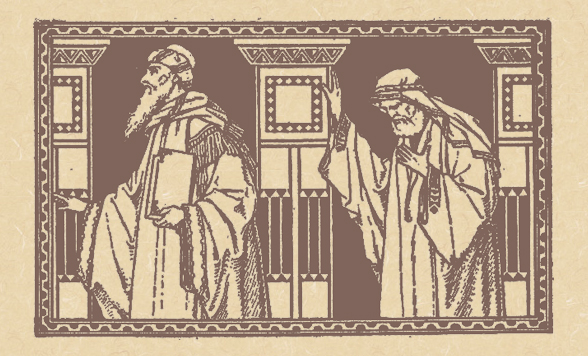Don't Make God a Liar.
The Fourth Saturday of Lent.*
Lessons from the feria, according to the ordinary form of the Roman Rite:
• Hosea 6: 1-6.
• Psalm 51: 3-4, 18-21.
• Luke 18: 9-14.
The Fourth Saturday of Lent; and, the Commemoration of the Forty Holy Martyrs.**
Lessons from the feria, according to the extraordinary form of the Roman Rite:
• Daniel 13: 1-9, 15-17, 19-30, 33-62.
• Psalm 22: 4.
• John 8: 1-11.
FatherVenditti.com
|
 2:38 PM 3/10/2018 — Our Lord, in the parable in today's Gospel lesson, speaks to us of two men who go into the temple to pray. Both of them are sinners. That’s important to remember: both of them are sinners. But only one of them admits it. And our Lord points out that the tax collector who admitted he was a sinner left the temple a happier man. Why? Because he was honest. The Pharisee, on the other hand, instead of telling God his sins, tells God what a wonderful guy he is, how much he gives to the temple, how much he fasted, how much he prayed, etc. And Jesus says that this was not pleasing to God, not because these are not good things to do—because they are—but because he didn’t tell the whole story. He didn’t tell God his sins. 2:38 PM 3/10/2018 — Our Lord, in the parable in today's Gospel lesson, speaks to us of two men who go into the temple to pray. Both of them are sinners. That’s important to remember: both of them are sinners. But only one of them admits it. And our Lord points out that the tax collector who admitted he was a sinner left the temple a happier man. Why? Because he was honest. The Pharisee, on the other hand, instead of telling God his sins, tells God what a wonderful guy he is, how much he gives to the temple, how much he fasted, how much he prayed, etc. And Jesus says that this was not pleasing to God, not because these are not good things to do—because they are—but because he didn’t tell the whole story. He didn’t tell God his sins.
Every time we commit a sin and don’t confess it, we lie to God, for a lie isn’t just telling something that isn’t true, but also not telling something that is true. Every time we receive Holy Communion conscious of a serious sin that we have not confessed, we lie to God. And it’s a futile lie because God already knows the truth. The irony is that there’s no reason for it since we know, even before we confess our sins, that we’re going to be forgiven. If we tell the truth to God up front in confession, and express true sorrow for what we may have done, we know that we will be forgiven. The only thing that holds us back is admitting to ourselves that we are sinners.
Some of you may have personal experience with Alcoholics Anonymous. For those that don’t, it’s a program of recovery from addiction which consists of a series of steps—twelve in all—that must be taken in order; and what’s the first step? The first step is admitting to yourself that you have a problem. And why is that the first step? Because if you’re not willing to admit you have a problem, there’s no program in the world that can help you. Over the years I’ve had a lot of experience with with doctors. Well, if you don’t tell the doctor where it hurts, he can’t treat you. Some of you have been to see therapists. Well, if you don’t tell the therapist what’s bothering you, he can’t help you understand why. If you don’t tell Christ your sins, He won’t forgive you.
And so, as we continue this Lenten journey into the desert of our own souls, the Church presents to us these two men who walk into the temple to pray. One admits who and what he is, the other does not, and we must make a choice which example we will follow. The choice we make will determine a lot.
St. John says:
Sin is with us; if we deny that, we are cheating ourselves; it means that truth does not dwell in us. No, it is when we confess our sins that he forgives us our sins, ever true to his word, ever dealing right with us, and all our wrong-doing is purged away. If we deny that we have sinned, it means that we are treating him as a liar; it means that his word does not dwell in our hearts (I John 1: 8-10 Knox).
We all have sins. Some of us have big sins, some have sins that aren’t so big. Ultimately it doesn't matter, because if we take them all to the Lord—big, little and in between—he will forgive them all. All that is important to him is what was important in the parable today: that we tell them honestly and with sorrow. The prayer of the tax collector is, therefore, the perfect motto for us as we continue our journey through Lent: “God, be merciful to me, a sinner.”

* Because Lent began on a Wednesday, today is the fourth Saturday. Cf. the post here under the heading "Hey, aren't you off by a week?" for an explanation of how the days of the liturgical calendar are rendered on this site as opposed to how they are designated in the Roman Missal.
** Under Licinius, forty soldiers of the garrison of Sebaste in Armenia were exposed on a frozen pond for refusing to sacrifice to idols. All persevered but one, whose courage failed him, and he perished in a bath of tepid water prepared for him. But their guard, inspired by their example and by grace, took his place and died with them, so there were forty martyrs still. They suffered in AD 320.
|

